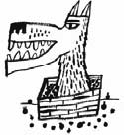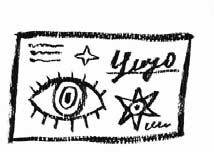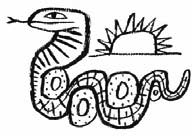The Yggyssey (5 page)
Authors: Daniel Pinkwater
"When They Drop the Atomic Bomb," by Jackie Doll and His Pickled Peppers is a typical song popular on this radio stationâit's all about how General MacArthur should drop the bomb on the Communists in Korea.
Mr. Mangabay is an anti-Communist, and an atom bomb fan. There are a lot of those around. Neddie Wentworthstein has a Hallicrafters shortwave radio in his room, which is actually a glassed-in sunporch, and sometimes we listen to hams. Hams are amateur radio operators. They talk to each other about their radio sets, and what other hams in other places they have talked with. It's interesting for about ten minutes.
A lot of the ones Neddie's radio picks up live out in the California and Nevada desert areas and talk a lot about driving out to where they can watch the atom bomb tests. They take their kids, and a picnic basket at night, and watch the sky light up. They say it's real pretty, and say how General MacArthur should drop one on the North Korean commies.
Most adults act like the whole thing, the war and the atom bomb, are normal. At school we have all practiced diving under desks and tables and curling up into a ball with our arms over our heads when a teacher hollers, "Duck and cover!" That's supposed to protect us in case of a bomb flattening Los Angeles.
And, at Neddie's school, which is a military school, all the high school boys can't wait to get into the army and go fight the commies in Korea.
One time, an airplane flew over the city and tossed out thousands and thousands of little pieces of paper. We were running around the schoolyard, trying to snatch them. As one fluttered down above me, and as I reached up to get it I could see that it said "This could have been a bomb," and there was an outline of a bomb printed in red. I'm not sure what the point of that was, except to help me and every kid I know decide that we would probably be blown to cinders before very long, which is too depressing to think aboutâso we don't, mostly.

"It may never happen," Neddie Wentworthstein said.
"What do you mean? My father says the people in charge of everything, the politicians and the military, have a stone age mentality. They're going to keep making those bombs, and testing them, and finally blow the whole world up so there's nothing left but cockroaches and raccoons."
"Well, maybe that will be okayâif you look at it from the standpoint of a cockroach or a raccoon." Neddie gets this way from hanging out with those shamans, Melvin and Crazy Wig. They are optimistic to a very annoying degree. If you make a solid point in an argument with them, or with Neddieâfor instance, if you explain that people tend to be idiots and will sooner or later do something really, really stupidâthey will come back with folk wisdom, like "The wolf makes the blueberry strong."
"Isn't that supposed to be 'The wolf makes the caribou strong'?"
"Well, wolves like blueberries a lot too."
So I changed the subject. "What do you hear from your ghost friend, Billy?" I asked Neddie.
"He's been going over to Cal Tech and hanging out in that guy's ghost lab. They're all excited, and treat him really well, 'cause he's the only actual ghost they've ever seen."
"Ken Ahara, the grad student, was here, sniffing around," I told Neddie.
"Probably Billy tipped him off that there are a lot of ghosts in the old hotel," Neddie said. "Did you know that La Brea Woman hasn't been seen for a while?"
"I did! Where do you suppose she is?"
"No idea," Neddie said.

My father has a cream-colored Cadillac convertible with seat covers made of hand-tooled saddle leather, and a set of steer horns mounted on the front. Sometimes he and I drive around aimlessly, listening to cowboy music on the radio. We usually wind up at the mushroomburger place, run by Hindu swamis. I could tell my father was thoughtful by the way he munched his mushroom cheeseburger with hot peppers and curry sauce.
"I've been thinking about my brother, Herman," he said.
"Prairie Dog Birnbaum, who disappeared so long ago?" I asked.
"The very same," my father said, dabbing at his mustache with a napkin. "No one seems to know what happened to him. He just up and vanished one day. I often wonder if he is alive somewhere, or merely dead."
"If he were alive, wouldn't he have gotten in touch with you sometime in the last fifty years?"
"Well, Herman was never much for writing," my father said. "It would not be unlike him to keep to himself unless he had something particular to say. I've asked all the old-timers, the cowboys and Indians, if they ever heard anything about him, but no one seems to know. I would like to find out what became of him."
"Can't you hire detectives? Don't they do that, find people?"
"Pinkerton men? I've had the Unblinking Eye Private Investigation Agency on the case for months," my father said. "They haven't come up with a thing. I've exhausted every resource but one."
"And what is that one?"
"The supernatural," my father said. "Your mother tells me that you have some connections in the spirit world."
"Well, only a couple, really, to talk with," I said. "But I am acquainted with some ghosts."
"Of course, your mother believes it's a delusion, brought on by stress, and as a psychiatrist, she'd know, I supposeâbut still, perhaps you wouldn't mind making some inquiries."
"Consider it done," I told my father.

I woke up all of a sudden at the crack of dawn. Completely awake. And restless. I felt like getting out of the apartment. I dressed in a hurry.
My mother was already up, doing her morning yoga.
"I'm going out, Mom," I told her.
"Remember to breathe deeply, dear," she said, breathing deeply herself while in the "confused cobra" posture. A minute later, I was out in the street. It was neat in the street at that hour. The sun wasn't quite up, and there was a soft, foggy feeling. No cars were running, there were hardly any lights in windows, and the streetlights were still on. I breathed deeply.
Then I realized I didn't know what I wanted to do now that I was up and outside. It was hours until school. I decided I ought to have breakfast. I walked over to Vine Street and headed for the Rolling Doughnut. It was open twenty-four hours, the sign saidâbut I'd only ever been there at more normal times, never so early or very late. A fresh cruller and a coffee with cream would be just right in the slightly chilly morning air.
When I got there, the place was open all right. I could smell the doughnuts cooking way down the block. I went up to the little window, got my cruller and coffee, and carried them to one of the wooden picnic tables. The place was practically desertedâonly one other customer, a boy about my age with a low hairline. He was hunched over a black coffee at one of the tables. Ugliest kid I had ever seenâhe had pale, greasy-looking skin, coarse black hair in a flattop cut, pudgy hands, a teensy nose, and a fat face. He was wearing a black turtleneck and sunglasses.
"Mind if I join you?" I asked the ugly kid.
"What difference does it make?" he said. He seemed depressed and proud of it.
I sat down across from him. "Sun's coming up," I said, which was kind of stating the obvious, but it was something neutral to say, just to see if he wanted to make conversation.
"Happens," he said. "Dawn on a doomed world," which was cooler than what I had said.
"You dig sounds?" the kid said.
I wasn't sure what that meant, but I took a chance.
"Um, sure. I dig sounds."
"Dig this," the kid said. He started drumming on the table with his stubby fingers. He drummed fast. There was no rhythm to it, just a lot of thumping on the table. It went on for a while. He was obviously caught up in it. Now and then I thought he was going to stop, but he kept on going, fast and slow, whacking different parts of the table. Finally, he came to the end.
"Know what that was?" he asked me.
"No."
"That was Symphony Number Five by Ludwig Van Beethoven," he said. "That cat knew what was happening."
"That's the first time I ever heard anybody drum a symphony," I said.
"Yeah, well, I'm the only one who does it," he said.
"It was good," I said.
"It doesn't matter," the kid said. "Dig. We're just raccoons on the city dump of civilization."
"I'm getting another cruller," I said.
"Get me one too," the kid said. "You got bread?"
"Bread?"
"Money."
"Oh, like dough! Yes, sure." I went to the window and got two crullers.
"My name is Yggdrasil Birnbaum," I said when I got back.
"Crazy," the kid said.
"What's your name?"
"They call me Bruce Bunyip." Bruce Bunyip stuffed the cruller into his face, getting crumbs all over his black sweater. Then he started drumming again. "You dig Diz?" he asked me.
"Diz? Dizzy Gillespie?"
"Yeah. You dig Diz?"
"I dig Diz."
"Cool. You dig Bird? Charlie Parker?"
"I dig him."
"Crazy. You wanna be my girlfriend?"
"I'll think it over," I told Bruce Bunyip.

I got invited to one of the famous sleepovers thrown by Mary Margaret Finklestein. Mary Margaret Finklestein is a girl at Harmonious Reality. Her father is some kind of big wheel in the movie business, and they live in a big house in Beverly Hills. Naturally, I wanted no part of it, but my mother persuaded me to go. She said I ought to have normal friends, and do normal activities. She said I needed socialization. "You don't want to be maladjusted," she said.
I
do
want to be maladjusted.
So I turned up at Mary Margaret Finklestein's house. Also attending the sleepover were Meg, Madge, and Peggy. Meg and Peggy are Harmonious Realitarians, and Madge is a girl Mary Margaret knows from her bullfighting class. This bullfighting class I know about. It takes place in the backyard of a music school on Beverly Boulevard. I've seen it. You go down this little alley next to the music school, and there is this dirt yard, all fenced in. There are two of these little short fencelike things at either end of the yardâthey're to duck behind to protect yourself when the bull charges you. The bull, in this case, is a set of horns mounted on a bicycle wheel, with handles like a wheelbarrow. Someone runs at you with the wheelbarrow-bicycle-bullhorns thing, and you wave the cape around and dodge the horns. No actual bulls are employed. I asked Mary Margaret if she planned to go down to Mexico sometime and do some genuine bullfighting. She said the bullfighting class was just to develop poise, grace, and confidence. She said that she would never hurt a living bull. I told her it was more likely that the bull would do the hurting.